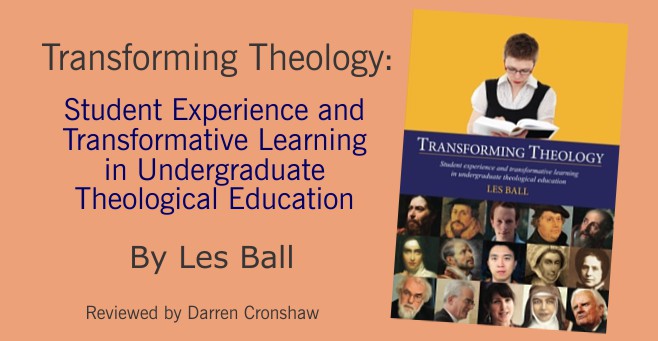
Transforming Theology:
Student Experience and Transformative Learning in Undergraduate Theological Education
By Les Ball
Posted by Darren Cronshaw on 17/08/2016
Old-school curriculum and teaching starts with content that is transferred from the lecturer to students via extensive note-taking. An important paradigm change to a learner-centred approach to education is to start instead with student experience and facilitate transformative learning. These approaches have a natural fit with theological education, which involves not just enhancing cognitive development but transforming a person’s inner life and helping them transform the world around. Most theological training providers promote their courses as transformational and aspire to meet learners at the level of their need and interest, and help them to develop holistically. However, this book by Les Ball argues, theological education in Australia has a tradition of conservative pedagogy, heavy workload and less time for reflection. Curriculum has been compartmentalized and foundationalist; that is, it starts with introductory overview units in different sub-disciplines and adds more advanced knowledge in later years.
Les Ball is the project manager for Transforming Theology, a project initiated by the Council of Deans of Theology through MCD University of Divinity and funded by the Office for Learning and Teaching. Ball’s work follows Charles Sherlock’s Uncovering Theology (2000), a quantitative overview of theological education in Australia that shows the number and range of colleges, courses and students involved. Ball’s Transforming Theology is a qualitative follow-up investigation of instances of theological education where transformative approaches and recognition of student experience occurs, and how they can be better utilized. Ball analysed curriculum, and surveyed and interviewed hundreds of students, graduates, faculty and church denominational leaders. The resulting report, published as the book Transforming Theology, offers an overview of curricula, principles of transformative learning, examples of good practice, and recommendations for further development in curriculum, learning and teaching.
The book includes a wealth of ideas on how teachers and providers are taking student experience into account and fostering transformation. Helpful instructional methods include problem-based instruction, inquiry-based learning, educational field trips, reflective journaling, collaborative assessment of group tasks, dialogue with people of other or no religion, and appreciative inquiry (see also Bushe and Kassam, 2005). Teachers are distributing electronic resources before class and offering reflective space at the end of class to consider application to life and ministry. Culturally and Linguistically Diverse (CALD) students are using the Bible in their first language and church history students are writing histories of their own church. Some programs are broadening to focus on ministry skills and spiritual formation alongside or supported by traditionally core biblical and theological subjects. Some teaching is starting with the context of the student’s world and asking how the Bible and tradition addresses that. Student experience is often best utilised in the growing field of Supervised Theological Field Education (STFE; see Floding 2011). While the book demonstrates there are positive steps in more transformative directions, and clearly lots can be learned from different colleges, there is also scope for more intentional and systemic development of how to be learner-centred and facilitate transformation in the field of theology.
Transforming Theology suggested to me two particular areas for further inquiry and reflection for teachers, practitioners and researchers: introductory skills units and field placements.
To take the former, instead of focusing on majors that are introduced in first year, and later expanded on, Ball suggests starting in first semester with establishing a hermeneutical skills base. Introductory skills units that are part of an overall course can have less content but more space for identifying theological frameworks, and for learning theological reflection and critical thinking skills as a platform for integrative learning. This can then be developed and applied through the course, concluding with capstone or reflective practice units in the final semester for personal integration and synthesis. The journey is thus from skills development, through theological discovery, to personal integration. Different colleges have developed introductory units, often taught by a team of teachers, that focus on worldview, vocation, hermeneutics or cross-cultural understanding. The common theme is establishing a base for a holistic theological program. It is an important place to start taking account of the experience of students and set them up for a transformative learning journey.
The other transformative ingredient is field placements. Theological education has a long history of including ministry experience, but it has not always or consistently been integrated into degree programs or courses and given appropriate credit. STFE has brought new levels of reflective depth and supervisor accountability in field placement, but its practical reflective practice needs to spread across the curriculum. Ball suggests learning from human service professions, especially teaching, social work and nursing. These professions expect integrated practical placements. Some universities have completely redesigned their courses around professional practice, for example devoting nursing’s third year to clinical practice and reflective learning. They aim to develop professional identity and attentiveness to patients as well as skills and knowledge. The challenge for theological education is to similarly help ministers-in-training to develop their identity and attentiveness to the church and society that they are called to serve. Placements do not have to be just in church ministry. There is a need for more placements in innovative mission contexts, advocacy and so-called ‘secular’ settings. We need ongoing analysis of how best to place learners in stretching practicum contexts.
While the book could not cover all Australian theological education, there is some innovative practice that the research unfortunately did not discuss, which could have added a useful dimension. The Australian College of Ministries offers practically-focused and flexibly-delivered training for church ministry, with compulsory personal formation subjects, all focused on helping students learn in their ministry work context. In addition, Ball’s project was focused on undergraduate theology but there are some excellent transformative graduate level courses that could have added to the complex picture he presents. For example, Tabor Victoria’s Master of Arts in Vocational Practice puts experienced practitioners in ministry, aid and development, business, media or health together in peer groups for learning and assessment tasks, maximising their reflection on practice. These are recent innovations and, like many other programs mentioned in the book, are worth evaluating and learning from.
Ultimately there is a vocational shift the book encourages – from being a teacher of content to a facilitator of learning and transformation. It encourages academic staff to think of themselves not firstly as a lecturer in their discipline but as a teacher of students. The task is not primarily to convey content but, for theological education, to apprentice leaders for their ministry in church and society.
With its wide sampling of theological education in Australia and focusing the importance of student experience and transformational learning, Transforming Theology is essential reading for all theology faculty, and relevant for others interested in higher education research and development.
Preston, VIC, Mosaic Press, 2012, pp.177, $44.95 (paperback), ISBN 13: 9781743240298
References
Bushe, GR and AF Kassam. 2005. When is Appreciative Inquiry Transformational? A Meta-Case Analysis. The Journal of Applied Behavioral Science, 41(2): 161-181.
Floding, Matthew, ed. 2011. Welcome to Theological Field Education! Reflective Practice. Herndon, VA: Alban Institute.
Sherlock, C. 2000. Uncovering Theology: The Depth, Reach and Utility of Australian Theological Education Adelaide: ATF.
This review was originally published in Higher Education Research & Development 33:3 (2014), 632-634.
